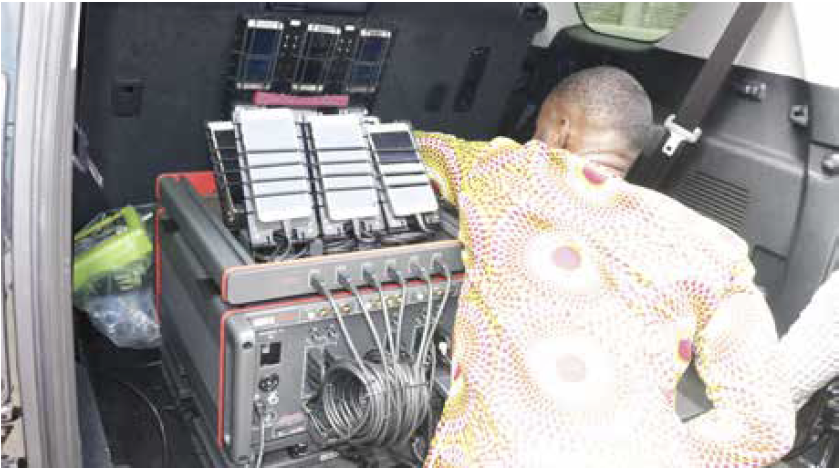Communications Monitoring Centre
Background
Quality of Service (QoS) refers to all the requirements a telecom service needs to meet consumers’ implied and stated expectations of a service they are receiving. QoS is characterised by the combined effect of the service, network elements, terminals and infrastructure. Quality of Service is one of the most important consumer-facing attributes that Mobile Network Operators have to deal with. It essentially has to do with consumers being able to complete calls, have calls set up on time, avoiding call drops, congestion and similar attributes applicable to their voice and data experiences.
The National Communications Authority (NCA) regularly monitors the performance of service providers alongside the extensive benchmarks for the QoS parameters stated in their licence conditions. This performance monitoring exercises are conducted quarterly to enhance communications services. The Authority tests all networks to measure compliance with stated QoS indicators for voice and data services. This is important because the NCA as a referee must ensure that consumers get value for money, and that the services provided by operators measure up to appreciable standards.

Mandate of the NCA on Quality of Service (Voice and Data)
The NCA is mandated to ensure that telecommunications operators deliver the required quality of service to enhance quality of experience of users. The National Communications Authority Act, 2008, mandates the Authority to regulate and monitor licensees and holders of frequency authorisation. Also, section 6, subsection 2(b) of the Electronic Communications Act, 2008 (ACT 775), provides that the Authority shall specify the means to enforce a licensee’s compliance with its stated quality of service standards.
Previous Approach to Measuring Quality of Service (Voice and Data)
The Authority by its mandate used the following approaches as the means to monitor and enforce theircompliance with stated Quality of Service obligations: – Submission of monthly QoS reports by Mobile Network Operators (MNOs) and Broadband Wireless Access Service Providers (BWAs) – Field Test (Drive Test) Monitoring of 2G and 3G services in all district capitals with system inability to test CDMA technology used by a previous operator.
Gaps Which Required the Authority’s Action
With this approach, a gap analysis of the aforementioned approaches presented certain deficiencies which necessitated the need for further intervention, and other complementary solutions for that matter. The following deficiencies and gaps were noted and had to be curbed;

1. The Authority’s reliance on reports from operators and complaints from service users to ascertain service performance.
2. Network performance reports from the monthly QoS reports were purely declarative and in most cases did not reflect experience of users in a geographical area.
3. Inability of the Authority to independently verify monthly QoS reports from Mobile Network Operators (MNOs).
4. Inability of the Authority to have near real-time oversight of MNOs’ performance.
5. Having holistic or full visibility of MNOs’ network with regard to their network availability and reliability.
6. Inadequate decentralisation of drive test systems as means of service performance assessment in given geographical location.
7. Drive tests were previously done randomly.
The Current Approach to Quality of Service (Voice and Data)
The existing approach presented the need for additional solutions and augmentation of existing solutions, which can best address the challenges that affect the monitoring regime.
The under listed are the interventions/new approaches adopted by the Authority to improve QoS monitoring and compliance:

